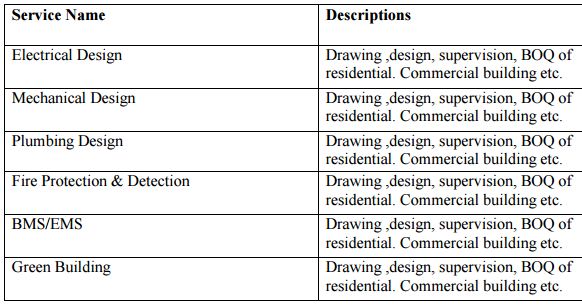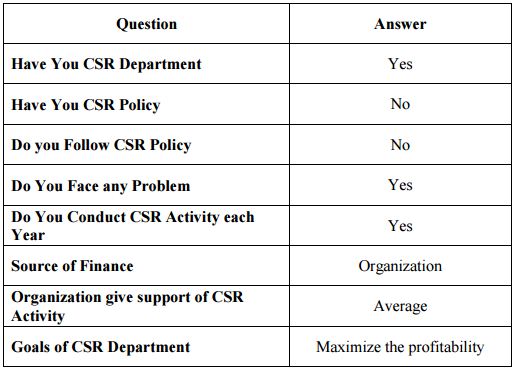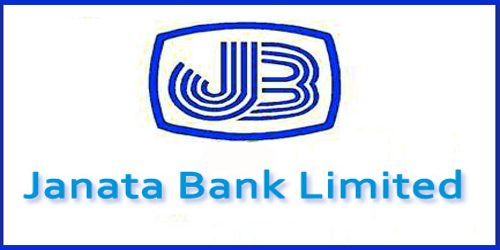Corporate Social Responsibility of EMCS
Focus on Practice and Perpetuity
EMCS (Electromechanical Control Services) is an Engineering organization established in 2004, embraced by a group of professional Engineers. This organization is involved in the electro-mechanical design, consultancy and supervision. eMcS extended its activities throughout Bangladesh due to its tremendous performance. The main fields of these activities are- Central Air Condition System, Fire Detection and Protection System, CCTV or Security System, Plumbing System, Electrical System, Solar System, Clean room, Access Control System, Green Building and any types of electro-mechanical control system and Project Management, Co-ordination, Implementation, Supervision and troubleshooting. By the experience in last few years it has gathered a sufficient acceptability to the private Entrepreneurs.
The vision of the EMCS (Electromechanical Control Services) is “becoming the market leader in consultancy arena in Bangladesh”. For achieving the vision, it has also a mission. Its mission is to “exceed its customer satisfaction and believe in quality not quantity of works”.
Introduction:
Corporate social responsibility (CSR) has emerged as a form of sustainability governance with advantages to the economic, environment and social progress. According to a study by ACCA Bangladesh in 2012, there was only 31% of companies had reported to some extent in the social performance while 12% were pending to do so in future and most CSR commitment was expressed in terms of charity (Daily Star). This shows that current awareness on CSR has increased among organizations in Bangladesh. Therefore, this report aims to analyze the extent of CSR practices among different types of organization and industries in Bangladesh.
CSR is known as Corporate Social Responsibility. According to Investopedia, “CSR is corporate initiative to assess and take responsibility for the company’s effects on the environment and impact on social welfare. The term generally applies to company efforts that go beyond what may be required by regulators or environmental protection groups. Corporate social responsibility may also be referred to as “corporate citizenship” and can involve incurring short-term costs that do not provide an immediate financial benefit to the company, but instead promote positive social and environmental change.”
In Bangladesh perspective, CSR is something very philanthropic work. Most of the organizations perform their CSR activities as a charitable work. In most of the cases, banks perform it very randomly which is eye catchy. On the other hand, very few organizations performs it strategically which is aligned with their values & objectives. In an article, (Miah, 2006)said,” These philanthropic activities included donations to different charitable organizations, poor people and religious institutions. Till now, most of the businesses in Bangladesh are family owned and first generation businesses. They are involved in the community development work in the form of charity without having any definite policy regarding the expenses or any concrete motive regarding financial gains in many instances.”
Apart from that, there are some issues in Asia, which is particularly connected with CSR. And CSR Asia is tell in emerging issues of CSR. According to CSR Asia, environment & climate change, labor &human rights, transparency & accountability, poverty alleviation, stockholder view etc. are some of the core issues of CSR, which need to address by the organization. But in Bangladesh, this concept is hardly followed. Followed by, tax exemption is another cause for performing CSR at a high rate. “Any company will get exemption of Income Tax at the rate of 10% for actual cost/money expended in Corporate Social Responsibility”.
Background of the Study:
Sustainable development is an idea of ensuring better quality of life which aims to protect environment, enhance social progress, use natural resources prudently and maintain high and stable economic growth. CSR is believed to have a significant influence on corporate sustainability. In the business context, CSR has emerged as a form of sustainability governance with advantages to the economic, environment and social progress. In terms of governance through policy implementation, CSR can be practiced in a strategic manner with better understanding. Policy framework can be designed using a mixture of regulations, economic instruments and communication strategies which significantly affects the environmental and social impacts from corporate activities. This might influence the level of corporate sustainability. Companies are aware that they can contribute to sustainable development by managing their operations in such a way by enhancing economic growth and increasing competitiveness besides protecting environment and committed to social responsibilities. Hence, sustainability in business could not be achieved solely by profit maximization but through responsible behavior and market orientation. In developing country like Bangladesh, the importance of CSR has been recognized by most corporations to ensure long-term business success. CSR can be adopted within company‟s policies, strategies, programmers and commitments toward social and environment. Organization must now evaluate CSR projects in light of their ability in producing not only social benefits to the community but also economic benefits and thereby, ensuring value for stockholders. By having social responsibilities, suppliers, business associates, and customers would have more confidence in the organization and therefore, increases sales and lead to profit maximization.
Thus, larger organization may have extra resources for undergoing CSR activities and having bigger impact onto society. Industry which has inverse impact on environment and society will be more concern for CSR in order to sustain their business operations.
Objective of the Study:
The objective of this report is associated with the term paper purpose. The report objective is to acquire practical facts and experiencing the corporate working environment. To this concern, this report is contemplating the knowledge and experience accumulated from research program. With the set rules and suggestion by the Brac University and with the generous assistances of the organization and the research supervisor, this report mainly comprise of the CSR responsibility of EMCS.
Primary Objectives
The objective of the study is to gather practical knowledge on CSR responsibility of EMCS. This program gives me a chance to co-ordinate with the theoretical knowledge and practical scenario. The following are of objective for this research report:
Secondary Objectives-
- To apply theoretical knowledge in the practical field
- To know the corporate social responsibility of different organization
- To know the corporate social responsibility of EMCS
- The reason behind performing the CRS activity by EMCS
- What type of CSR activity EMCS perform
- To know the different type of CSR activity
- To know the present scenario of CSR activity in Bangladesh
Overview of the Consultancy Sector in Bangladesh:
The development sector MEP consulting has been making strides towards a brighter future for the last few decades or so. Bangladesh is a fairly large recipient of overseas development assistance. There is substantial room amongst the market players for healthy competition.
This may have contributed towards the growth of development sector-focused management consultancies and MEP firms in the country. Building up on their reputation, firms from Bangladesh are now working internationally on development projects.
I represent EMCS Consultants Ltd., which is based in Bangladesh, and now works internationally in multi-disciplinary sectors which include, among others. Our major clients include development agencies like public/government agencies within the country, private organizations. EMCS has been the top ranked international consulting firm in Bangladesh.
This indeed has been an achievement for a Bangladeshi firm competing globally with local resources. What makes us different is the sheer prowess, drive, and talent of our young team, whose average age is between 25 to 32. This is the youngest team not only in Bangladesh, but possibly in the industry itself in South Asia.
While MEP consulting has not been perceived as the apple of the eye for the country’s fresh graduates in the past, the development sector as a whole and management consulting in particular have been getting increasingly popular in recent times. With promises of enthusiasm and energy from new faces, I would argue that the management consulting in the development sector may experience a steeper curve towards success in days to come.
This is one of those industries where you can both make money and have an impact on the society and the country you choose to serve. That is why a job in this industry is one of the most sought after by graduates of the leading engineering schools of the world.
Access to information is often a big challenge for firms in the developing countries. In the case of Bangladesh, corruption and poor governance makes it an arduous task for ethical firms like EMCS to have opportunities to compete fairly where merit is the supposed to be the sole deciding factor in awarding projects. To be honest, that is one of the reasons why in spite of our success internationally, we hardly compete for projects locally unless we are confident on the ethical standards the local client will follow. It is ironic that while we are outsmarting top notch international competitors outside the country, in our own country, we hardly find the space to participate on the basis of good business practices. However, firms like EMCS are making the next generation realize the value of the management consulting industry. Should we be able to illustrate a bright career opportunity in this industry for the top minds of the country, we may very well become self-sustained in terms of resources.
Electromechanical Control Services (EMCS):
EMCS is an Engineering organization established in 2004, embraced by a group of professional Engineers. This organization is involved in the electro-mechanical design, consultancy and supervision. eMcS extended its activities throughout Bangladesh due to its tremendous performance. The main fields of these activities are- Central Air Condition System, Fire Detection and Protection System, CCTV or Security System, Plumbing System, Electrical System, Solar System, Clean room, Access Control System, Green Building and any types of electro-mechanical control system and Project Management, Co-ordination, Implementation, Supervision and troubleshooting. By the experience in last few years it has gathered a sufficient acceptability to the private Entrepreneurs.
Service Offered by EMCS:
EMCS offer varies type of services. Also provide customized service based on the customers demand. EMCS not believe on quantity but they believe on quantity. List of services provided by the EMCS are below:

EMCS CSR ACTIVITIES
There is in Bangladesh a long history of philanthropic activities from time immemorial. These philanthropic activities included donations to different charitable organizations, poor people and religious institutions. The CSR World Wide portal conclude that, in Bangladesh Civil society, businesspeople and politicians view CSR in terms of philanthropy, particularly in the schools and the healthcare sector. This focus is also rooted in the country’s Islamic tradition of calling upon those with more resources to help the disadvantaged. Accordingly, companies are expected, most of all, to engage in charitable works, for example by providing donations or in-company training programs .Till now, most of the businesses in Bangladesh are family owned and first generation businesses. They are involved in community development work in the form of charity without having any definite policy regarding the expenses or any concrete motive regarding financial gains in many instances. Moreover, most of the SMEs fall under the informal sector having low management structure and resources to address the social and environmental issues. The discussions on CSR practices in Bangladesh in its modern global terms, is relatively new. In general, it is true that in Bangladesh, the status of labor rights practices, environmental management and transparency in corporate governance is not satisfactory, largely due to poor enforcement of existing laws and inadequate pressure from civil society and interest groups like Consumer Forums. Globally, as CSR practices are gradually being integrated into international business practices and hence is becoming one of the determining factors for market accesses, it is becoming equally instrumental for local acceptability. A focus on CSR in Bangladesh would be useful, not only for improving corporate governance, labor rights, work place safety, fair treatment of workers, community development and environment management, but also for industrialization and ensuring global market access. By now, many CSR dimensions are practiced in Bangladesh. Though CSR is a relatively new concept in Bangladeshi corporate culture, awareness of corporate social reporting has rapidly increased. All companies need to consider their CSR for two basic reasons. Firstly, there is intensifying pressure from stakeholders to do so. Any company that does not develop and promote its CSR policy to all stakeholders will face increasing threats to its reputation. Secondly, because it makes sound business sense, CSR enhances the reputation of an organization, brings in new business and improves stakeholder return. The government of Bangladesh has not imposed or proposed requirements for disclosure of social and environmental performance. The Bangladesh Companies Act 1994 sets the general framework for corporate financial reporting. However, no provisions regarding CSR exist in the Companies Act 1994. Until recently, there has not been a separate Bangladesh Accounting Standard (BAS) regarding social and environmental reporting. In Bangladesh, CSR is still voluntary with the exception of disclosure of expenditures on energy usage required under the Companies Act of 1994 and the Securities and Exchange Rules of 1987, which require the total amount spent on energy to be shown as a separate expenditure in the notes to the financial statements. Since corporate social reporting disclosure is voluntary in Bangladesh.
However some progressive companies disclosed some information on community, environmental and consumer related activities. Imam concludes that the sample listed companies tend to represent a relatively minor quantity of disclosure when compared with corporate financial disclosures. In the absence of independent verification, the credibility of information disclosed is questionable. Furthermore Hossain et al. investigated CSR by using the annual reports of 107 non-finance companies, for the financial year 2002-2003, showing that: an average 8.33% of Bangladeshi companies disclose social and environmental information in their corporate annual report. They concluded that the disclosure of social and environmental information made by the listed companies in their corporate annual reports in Bangladesh is “very disappointing”.In recent years there is considerable pressure from various agencies for companies to act responsibly and be accountable for the impacts they have on social, political and ecological environments. Companies are also expected to participate in solving social problems, such as poverty and infrastructure. Miyan was hopeful that a number of corporations are now following an increased commitment to CSR beyond just profit making and compliance with regulation. It also found that initiatives in CSR activities in Bangladesh are pioneered by Multinational Companies. Since Bangladesh is now exposed to global standards, it can be anticipated that the CSR activities in Bangladesh will continue to be extended. Firms are now trying to uphold their corporate image of socially responsible firms and consequently influence consumer buying decisions in favour of the goods and services marketed by them. Though it is explained that CSR is a set of practices that forms a part of good management or business practices much of it is about transparency and disclosure. Many organizations find that in actuality they already do much of what is considered “CSR” but often do not have formalized systems to report on those activities.
Additionally CSR should not be viewed as an add-on activity as it is a concept of good practice that cuts across an organization . Zakir et al. disclosed that Bangladeshi firms should focus on CSR not only for improving corporate governance, labour rights, fair treatment of workers, community development and environment management, but also for industrialization and ensuring global market access. Ataur hopes that the government of Bangladesh is going to undertake an initiative to promote CSR practices. The objective would be to encourage the businesses to carry out the good citizen-like activities with the aim to reversing the perceived trend of businesses to have little commitment to society. None of this research looked at the labour rights like workplace health and safety environment, employment standards, including general holidays, annual vacations, working hours, unjust dismissals, minimum wage, layoff procedures etc – issues that should be complied with by the company as well as CSR standards.
CSR Definition by the EMCS:
What we understand by CSR that CSR activities can be the cause behind better performance and can also produce more revenue and growth. Companies that are socially responsible usually generate satisfactory financial returns. Some internal areas of business that are influenced by CSR are: human resources management, health and safety during work, adjustment to changes and management of environmental impact and natural resources. The external areas include local communities, business, partners, suppliers and consumers, human rights and global environmental issues.
Moreover, Corporate Social Responsibility, `Every successful corporation has a responsibility to use its resources and influence to make a positive impact on the world and its people. Economically, Environmentally and Socially Responsible, EMCS endeavors to, achieving success in ways that respect ethical values, people in need, their communities and the environment.’ The Company’s key strategies always aim to provide a strong return for shareholders, while creating social and economic value in the communities where it operates.
Aims of CSR Department:
- Create a positive image in the market about the company.
- Increase the company‟s profitability
- Increase the brand value
- Create a positive impact within and outside of the organization
Create the image of reliable business partner:
Customer care and satisfaction is top priority, regardless of the type of product or service offered. Aim is to improve the quality of customer service, partnerships, and ethical behavior in relationships with customers, adherence to contract terms with our customers and suppliers (timeliness, quality), transparent trade and complaint procedure and additional services offer.
Responsible for the environment:
As a mining company, company cannot avoid the harmful effects of our activity, however, conscious of the responsibility for the negative environmental consequences, we are taking steps to minimize the negative effects, and in many cases we make a major contribution to reclaim of the land. Organization increase our responsibility for the environment through the implementation of the assigned tasks, including meeting the requirements of environmental protection under the best available techniques (BAT). Organization overriding goal is to protect waters against salinity, sound management of waste (mining, hazardous, and others), greenhouse gases reduction, minimizing the mining impact on surface area and environmental education of employees.
Ensure good and safe working conditions:
company’s most important asset is its people. We make every effort to take care of their development and safety. We feel responsible, as the largest employer in the region, to attract qualified staff and provide them with a stable, good job and the best conditions. Our aim is to increase the level of safety and health at work through technical improvement of the mines, natural hazards monitoring, reducing the impact of human factors on accidents and improving the quality of training. Activities under this strategy will be focused on supporting the local community employment, building the image of a good and stable employer, building an organizational culture of commitment, focus on results and increasing productivity.
Active participation in community life:
We are not only a business entity, but also a member of the local communities in which we operate. We strive to build good relations with representatives of these communities. Through thoughtful activities that fit into the Vision and Mission of our company we reach potential or current stakeholders. Through these activities we also build the bond and a sense of solidarity with the environment and its problems.
Our aim is to support local community initiatives, building the image of JSW as a patron of sports, to promote the development of scientific institutions, health services and programs which support talented youth.
Overview of the CSR Activities of EMCS:
EMCS conduct many types of CSR activities. Some of them are given below:
- Training & Skills Development Activities
- Health and Welfare of its employee
- Health and Welfare of its people
- Scholarships to the meritorious students
- Pure drinking water to the slum dwellers
- Environmental awareness campaign
- Blood donation program
- Art & culture
- Social Welfare
- Happy Heart Child Care
- Cafeteria
- Religious Program
Interview Questionnaires & Result about CSR in EMCS:
In the time of season with CSR officials I asked them the following question and I found the following result:

CSR Activities done by the EMCS:
CSR department perform the following activity in external area:
Training & Skills Development Activities:
Started training using the office premises, resulting in a total of 234auto cad operators trained in 4 years to create employment opportunities in constancy and construction sectors.
Pure drinking water to the slum dwellers:
The Company had provided pure drinking water to the slum dwellers at Rayerbazar Boddhovumi.
Community plantation initiative :
In July 2012, EMCS undertook a community plantation initiative with Youth Forum, Syllet . Under this project, 7,500 trees were planted in 750 households surrounding the protected forest area of Satchari, located at Habiganj, Sylhet.EMCS also undertook a tree plantation event at Mirpur DOHS in September 2012, by planting 700 ornamental trees in the area for the purpose of beautification and creating a greener environment.
Environmental awareness campaign :
EMCS has launched an environmental awareness campaign in different school, in partnership with LEADS, targeting primary school children. The very first session was arranged at Udayan Higher Secondary School on October 1, 2013. Moreover, EMCS provided special stickers with messages for responsible utilization of electricity and water, and different color waste bins to start the practice of sourceseparation of waste materials. EMCS will undertake in different schools across
Bangladesh. An agreement was signed in this regard with LEADS, a social organization of TRK Consultancy Services, on September 16, 2013.
Shishu Bikash Chhaya :
On October 9, 2014 EMCS sponsored Shishu Bikash Chhaya a residential centre providing better education and healthcare facilities to underprivileged children. The centre, located at Old Dhaka, houses fifteen children, mostly orphans or from broken families in the slum areas. EMCS is sponsoring the centre for one month, and accordingly a cheque was handed over through a formal ceremony on October 09, 2014. Besides this residential facility, Shishu Bikash Chhaya also has plans to start a school for underprivileged children in near future.
Blood donation program :
EMCS has arranged a blood donation program at its Chittagonj branch on October 13, 2013, where employees and external stakeholders voluntary donated blood for Bangladesh Thalassaemia Hospital and Bangladesh Red Crescent Society.
- Preserving Cultural Heritage : In 2011, EMCS sponsored and organized the grand cultural event, at the Rabinda Shorover, marking the 150th birth anniversary of Rabindranath Tagore; It was premiered on 7th May at the Rabinda Shorover , Dhaka. EMCS also sponsored the making and distribution of the document .
- Awareness Campaigns : Every year, EMCS launch campaigns touching on different forms of heath impediments ranging from asthma, diabetes, hypertension and many more. Campaign activities include rallies in addition to organizing and sponsoring scientific seminars and conferences for various associations and societies in medical disciplines.
- Climate Change Program : As a responsible business, EMCS launched its ‘Climate Change Program’ back in 2010 to gain sustainability and as well as to help people and community. EMCS has an environmental Road map which aims to promote a lowcarbon society, and GP’s first priority is to take responsibility for the excess CO2 emissions generated by its own operations. GP has set a target of reducing 40% carbon emission (CO2) within 2015 from the business as usual situation considering 2008 as the baseline.
Renewable Energy :
EMCS initiated renewable energy project back in 2011 to operate the buildings common area. EMCS gives more concentration to make their design mor eco friendly by using the renewable energy system
CSR department perform the following activity in internal area:
Happy Heart Child Care:
EMCS has started the daycare center “Happy Hearts” back in April 20014 to stand distinct as one of the unique employers in the corporate arena. Caring is the first priority of the center because every child is unique in every way. In our Happy Hearts have a caring and development sector where the children get proper care and nurturing environment. Children do not just grow in size. There is a general pattern or sequence for development that is true of most children. However, the rate, character, and quality of development vary from child to child.
- Cafeteria : A well decorated and well furnished cafeteria for staffs
- Insurance for all staffs : EMCS arrange all permanent staffs Insurance.
Employee Welfare : The company undertakes various motivational activities to improve human values, mutual understanding, interpersonal relationship and loyalty among the officers and employees. In the year 2011-12 the company arranged the following social, cultural, religious and entertainment programmes on regular basis:
- Loan : In line with government policy for promotion of information technology, loans are granted for the welfare of the employees as per budget allocation for land purchase, house building, motorcycle purchase in the tune of Tk.20 lack and also for computer purchase in the tune of Tk.2 lacs during FY 2011.
- Labour act comply : EMCS is providing enough space to its employees to take an active part in the life of the community or by assuming responsibilities in professional, civic, cultural, religious or voluntary organizations. EMCS believes that any activity during working hours has to be first approved by the company. EMCS Bangladesh maintain a stable compensation structure in compare to the other corporate of Bangladesh. Compensation in the different levels of the employment always remains equal to or above the market benchmark. Compensation practice takes relevant external compensation levels as well as the requirement of internal fairness.
Findings:
Location: EMCS operates its CSV only in limited area. They can seek help from the office lab or from the engineers, that‟s why they only perform their activities on that area only. Thus, I would like to say that only one area operation does not contribute at its best. Because in that case, only one area start developing and others are not. So they should introduce their activities in nearby districts as well one by one. If they continue to perform it according to their factory wise or factory location, then it would be very limited operation and overall contribution will be very less.
Limited Resource: EMCS perform their activities as per the instruction of head office. So for that reason they have limited budget, access of information and control, instruction & supervision. Thus, whatever decision head office takes along with CSR department, most of the cases, CSR department needs to follow that. If CSR department wants to do something extra, they need to maintain the upper decision which is a disadvantage for them.
Limited Water Education: Water educations cover many things around the students which is a great source of learning. But this education is not for the in general village people. Whenever they provide the water education, they can gather the village people to be a part of water education so that, village people also have some knowledge and be a good citizen by ensuring ultimate effective use of water. EMCS can do it as a part of their promotion as well.
Not strongly positioned Rural Development: EMCS has started their rural development CSR not much way before. It is not strongly positioned till now whereas they are operating in a full form in Bangladesh from 1994. So this has to be in a good position by this time but as they became late, it will take time to develop. Although it is late but proverb says better late than never. We hope to get some good outcome from rural development by 2016.
Areas of CSV can be modified: From my point of view, too much focused activities on Nutrition or Nutrition as part CSV is not that much necessary as EMCS consider it in terms of Bangladesh. To me, right now there are lots of severe social problems in Bangladesh to address off. Among them poverty, unemployment, drug addiction, inequality in education etc. are some of them which should get priority. For example, the population below the poverty line is still around 31.5%. These people do not get a meal properly in a day. So in that case, CSR or CSV like nutrition, how much value it carries is a doubtful one. Side by side, poverty is highly connected with unemployment rate and the dropout ratio of the school children.
Teach for Bangladesh website shows, half of the students who enter class 1 drop out before they complete class 5. On the other hand, about 80% who remain till class 5, are drop out before they finish class 10. There are some factors behind it like wealth, income, social status, geographic location etc. but the irony is still there are many parents, who are not able to ensure the primary education of their children. So for them, having knowledge of nutrition unnecessary. Because priority simply does not make them to do that.
Lack of regular monitoring: In the analysis part, I have made a little survey over phone in 6 primary schools or Gazipur. The results are already mentioned above. From that result I can say the monitoring or follow up result is better than average. But still there are some lacking which needs to be addressed. To maintain their CSV commitment properly, EMCS should engage more people for regular monitoring and assessment to ensure highest and error free service from their end. Should maintain statistics of improvement: While my working on CSV operation, I faced difficulties as there was no significant files or books or data which can give some statistics of improvement. Construction of water tanks, girl’s toilets has physical evidence but if someone wants to know about the core information or the actual number of people who have benefitted, there is no exact data as evidence. So, the research and development wing of
EMCS can conduct a research to know about the number of actual beneficiaries Lack of opportunity to take independent decision: Independent decision making ability gives the opportunity to make best decision in a particular situation. But if there is interruption from other countries a decision cannot be successful all the time. Because product market is always vulnerable. Demand or any product is not stiff always. So sometimes, it is required to take prompt decision. Same thing is applicable for CSV as well.
For each and every problem or for urgent situation, if EMCS needs to wait for outsider‟s opinion, or if the process is lengthy, outcome will not be fruitful always. So in terms of CSV, EMCS should have the power to modify it from the ground of Bangladesh that is applicable and appropriate most.
Recommendation:
Create a CSR policy: It would be helpful if the government created a CSR policy setting out expectations that the government has of companies to work on CSR issues, and providing guidance on the kinds of activities possible.
Awareness building Programme: It would be useful if there was a greater awareness amongst businesses about corporate social responsibility and the kinds of CSR activities they could undertake.
Worker’s Rights ensured: Those undertaking CSR must ensure that they are complying with the law in relation to labour rights and any legal obligations they may have in protecting the local community and environment.
Capacity building: Companies should consider seeking assistance from outside bodies in considering what CSR activities they should or could undertake. _
Research and information sharing on CSR: Research into CSR achievements amongst Bangladesh companies.
Corporate CSR strategy: Companies should be encouraged to integrate CSR into their core values and articulate a specific CSR strategy. They should not wait for government pressure, they should boldly practice CSR activity for their sustainable business._
Stakeholder engagement: In originating the CSR strategy companies should identify those with a stake in the activities undertaken and develop a policy for communicating with them..
Performance management and governance: Evaluation measures are an integral part of the CSR strategy. When companies formulate their CSR strategies it should clearly state the indicators of performance, and in the course of strategy implementation performance shall be monitored to ensure that the CSR goals are being achieved. There should be a separate unit or department and at least a designated senior person within the company, who ensures governance in CSR implementation.
Public disclosure: Business should aim to disclose their CSR engagement to the public. Transparent reporting will improve the companies’ credibility; it will open up opportunities for coordination of CSR initiatives across businesses, and facilitate better research and inter stakeholder dialogue resulting in general improvement of CSR.
Opportunity to take independent decision: Provide the opportunity for taking the decision independently. It will makes CSR department more strong.
Regular monitoring: Need to increase the monitoring activity
Available Resource: Need to provide sufficient resources
Conclusion:
To conclude, I would like to say that, although there are some drawbacks from CSV side, but again, being nutrition and comparatively new company in Bangladesh, EMCS has improved a lot than ever before. Yet, they have many things to do in future which I have already mentioned. But as they are committed to the society and its people, hopefully with the passage of seconds, they will modify their strategy as well. Thus, their action and implementation will help them to be the world‟s most trustworthy company in terms of nutrition, health and wellness.
















